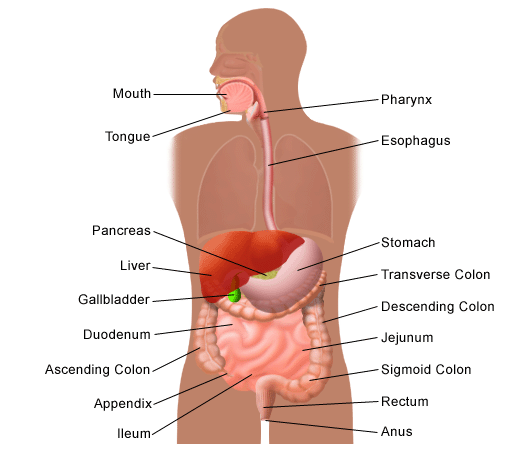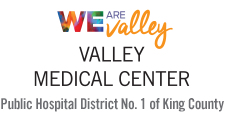Share your perspective and help improve the health of our community! We are conducting a Community Health Needs Assessment (CHNA) to help us better understand the health needs of the community our health system serves. Learn more and take the short survey.
Digestive Health (Gastroenterology)

What is a gastroenterologist?
A gastroenterologist is a doctor who is trained to help people with their digestive health. Gastroenterology focuses on preventing, diagnosing and treating digestive conditions that affect the appendix, esophagus, stomach, intestine, gall bladder, colon, rectum, bile ducts, pancreas and liver.
The digestive system handles food and nutrients from mouth to anus and is largely made up of a 25-foot-long tube which includes the throat, esophagus, stomach, intestines, rectum and anus. When these are working the way they should, along with the liver, pancreas and gallbladder, they break down and absorb the food we eat so nutrients can move into the bloodstream and be carried to cells throughout the body. When these organs are not working properly, people may need to see a gastroenterologist.
Get Screened: Learn about scheduling a colonoscopy.
In addition to rare disorders of the digestive system, gastroenterologists diagnose or treat the following common conditions:
- Colon and rectal cancer, including determining whether you have a genetic risk
- Hepatitis A
- Irritable bowel syndrome (IBS)
- Inflammatory bowel disease (IBD), including Crohn’s disease in adults and ulcerative colitis
- Diverticulitis, Diverticulosis and ischemic bowel disease
- Celiac disease and food intolerances
- Acid Reflux and GERD in adults
- Chronic vomiting and gastroparesis
- Functional illness, such as constipation, diarrhea, vomiting, belching and flatulence
- Peptic ulcer disease and Helicobacter pylori infection
- Acute and chronic pancreatitis
- Gallbladder disease
- Abdominal pain
- Appendicitis in adults
- Nutritional deficiencies
- Obesity
- Nonalcoholic fatty liver disease
- Cirrhosis
- GI infections caused by viruses, bacteria, fungi and protozoa
- Diseases of the biliary tract both benign and malignant (i.e. stones or cancer)
- Palliative stenting related to malignancies
- Feeding tube placement/replacements
If you have any of these conditions, your primary care provider may refer you to a gastroenterologist.
Tests performed by our GI doctors:
Gastroenterologists use a number of techniques to view the organs of the digestive tract. The most common tests they perform are colonoscopy and upper-GI endoscopy.
- Upper endoscopy
- Upper GI endoscopy (EGD) with Bravo placement
- Upper GI endoscopy (EGD) with Balloon or Savary dilations
- Capsule endoscopy with PillCam
- Esophageal manometry/ pH studies
- Colonoscopy: screening and diagnostic
- Endoscopic retrograde cholangiopancreatography (ERCP)
- Endoscopic ultrasound (EUS)
- Endoscopic electrohydraulic lithotripsy (EHL) with SpyGlass
- Pancreatic stent with Axios
- CT colonography
Digestion is how the body breaks down food and drink into smaller parts to build and feed cells and give the body energy.
Learn more about how the digestive system works.
Each year, millions of Americans are diagnosed with digestive illnesses, ranging from an occasional upset stomach to the more life-threatening colon and rectal cancer, as well as illnesses affecting the gastrointestinal tract, liver, gallbladder and pancreas.

Most digestive diseases are very complex, with subtle symptoms, and the causes of many remain unknown. They may be inherited or develop from things like stress, fatigue, diet, or smoking. Drinking too much alcohol creates the greatest risk for digestive diseases.
To find out the cause of a digestive problem, a detailed and accurate medical history and physical exam are needed. Some people may also need more testing, including imaging, lab tests, and endoscopic procedures.
Colon cancer affects more than 140,000 Americans each year, yet is easily treatable when found early through screening. Learn more about when you should get screened for colon cancer.
Other types of cancer that affect the digestive organs include esophageal cancer, bile duct cancer, stomach cancer, liver cancer and pancreatic cancer.
Learn more about how colorectal cancer screening saves lives
from Valley colorectal surgeon, Dr. Bernier.
Dr. Teng addresses the following questions:
[0:23] We've seen reports indicating a rise in colorectal cancer among younger adults in the United States. What have you observed with this trend over the past 10 to 15 years?
[1:17] What are key risk factors contributing to the increased incidence of colorectal cancer in people under age 50? How much do lifestyle choices versus genetics play a role?
[2:24] Many younger individuals may not be aware of the symptoms of colorectal cancer, or they might dismiss them. What symptoms should prompt someone to seek medical advice, especially those in the millennial and Gen Z populations?
[3:09] The American Cancer Society now recommends starting regular screening at age 45 for those at average risk. Could you explain the importance of this guideline and whether there are circumstances under which individuals should start screening even earlier?
[4:09] What lifestyle changes or preventive measures can younger adults take to reduce their risk of developing colorectal cancer? Are there any misconceptions about prevention that need to be addressed?
[5:24] If someone has symptoms, risk factors, or a family history of colorectal cancer, what do you recommend they do next?
 Valley's Endoscopy program is recognized by the American Society for Gastrointestinal Endoscopy's Quality Endoscopy Unit Recognition Program (ASGE EURP). The only national program of its kind, the ASGE EURP honors endoscopy units that show a commitment to patient safety and quality as reflected in their unit policies, credentialing, staff training and competency assessment, and quality improvement activities.
Valley's Endoscopy program is recognized by the American Society for Gastrointestinal Endoscopy's Quality Endoscopy Unit Recognition Program (ASGE EURP). The only national program of its kind, the ASGE EURP honors endoscopy units that show a commitment to patient safety and quality as reflected in their unit policies, credentialing, staff training and competency assessment, and quality improvement activities.
Debbie's Story: Colon Cancer Care
After opting for a home Cologuard test, Debbie received a positive result. Her primary care provider referred her to Dr. Joseph Roberts, a gastroenterologist in the Gastrointestinal Clinic. Dr. Roberts performed her colonoscopy that confirmed she had colon cancer. Dr. Greta Bernier, colorectal surgeon, successfully performed a robotic minimally invasive surgery, significantly aiding Debbie's recovery and return to everyday life.


